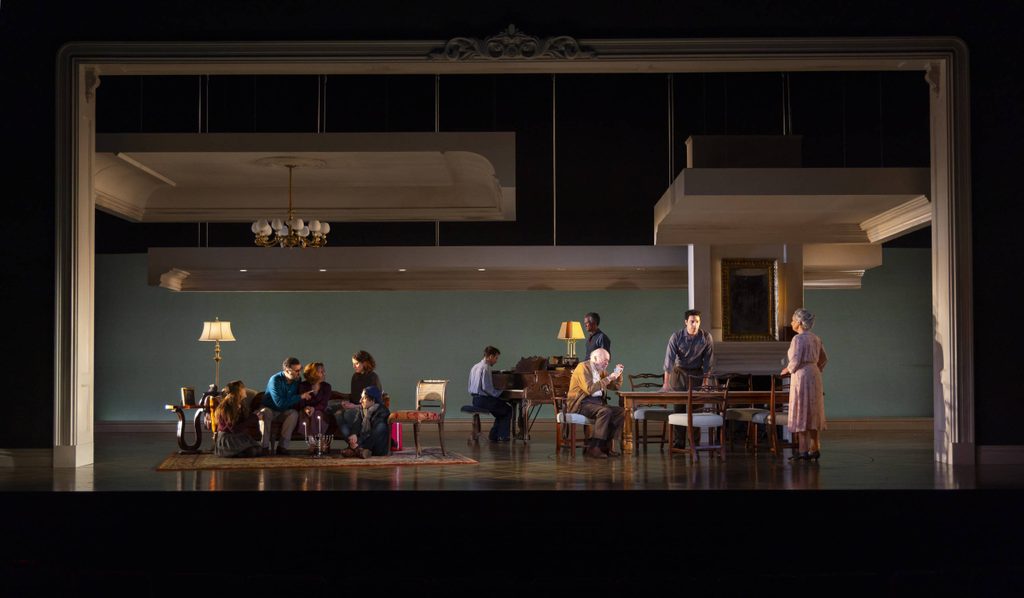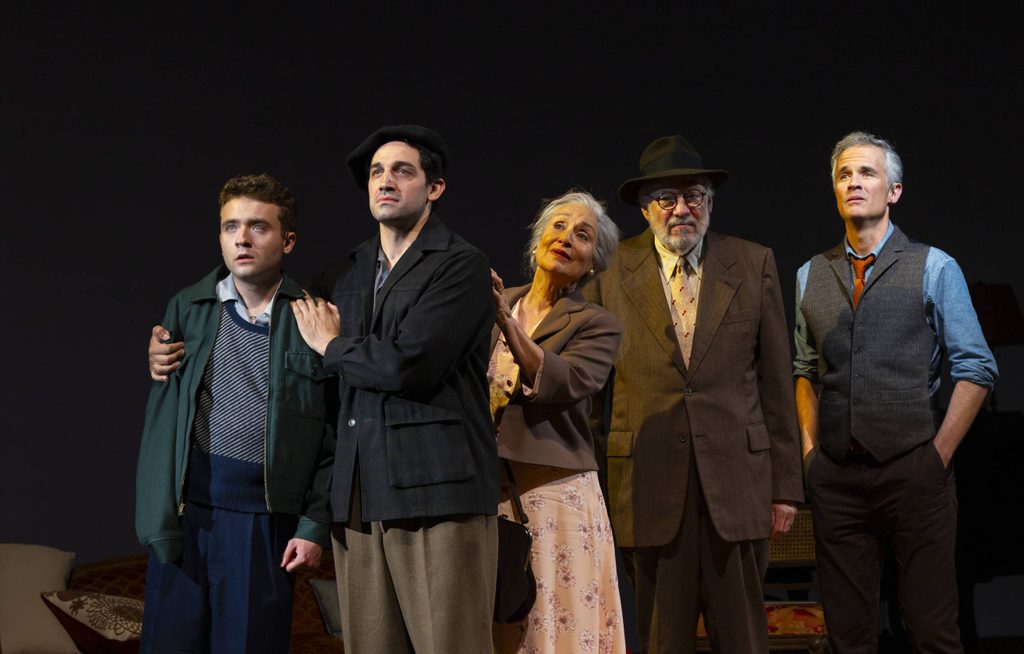
The cast of “Prayer for the French Republic.” Photo by T Charles Erickson.
Presented by The Huntington
By Joshua Harmon
Directed by Loretta Greco
Featuring: Amy Resnick, Nael Nacer, Tony Estrella, Joshua Chessin-Yudin, Talia Sulla, Carly Zien
Lighting Design by Christopher Akerlind
Scenic Design by Andrew Boyce
Dramaturgy by Charles Haugland
September 7-October 8, 2023
264 Huntington Ave
Boston MA
Review by Maegan Bergeron-Clearwood
Content advisory: This production contains vivid descriptions and discussions of antisemitism, violence and death related to the Holocaust, hate crimes, and sexual violence. It also contains one instance of blood.
BOSTON, Mass. — A classic adage: if you ask two Jews a question, you’ll get three opinions. Joshua Harmon’s Prayer for the French Republic features so many Jewish characters – secular and religious, Sephardic and Ashkenazi, patrilineal and matrilineal, Zionist and antizionist (and everywhere in between) – most of whom are relatives living under the same roof. Opinions are too numerous to count. Naturally, the play is three hours long.
The play is massive in other ways as well, bouncing between 2016 and 1944 and featuring 11 characters played by 10 actors. Harmon traces the legacy of the Salomon family, who have been living a comfortable middle-class life in Paris for decades, only to find themselves grappling with the same terrifying questions that their great-grandparents (and many Jewish ancestors before them) once faced: Are we safe here anymore? Is it time to flee?
For the most part, the production at the Huntington Theatre, directed by Artistic Director Loretta Greco, does not feel three hours long. Harmon has crafted messy, fascinating characters with messy, fascinating intergenerational relationships, and the giant story is grounded in moments of smallness and intimacy: patriarch Charles (played tenderheartedly by Nael Nacer), covered in flour, reveals the less-than-romantic origins of the family’s sufganiyot recipe; matriarch Marcelle launches into a screaming match with her adult daughter Elodie (played by the production’s two powerhouse actors, Amy Resnick and Carly Zien) over a wine glass left on the dining table; great-grandparents Irma and Adolphe (Phyllis Kay and Peter van Wagner) bicker and reminisce over a supper of bread and soup.
Harmon has just as much expositional ground to cover as he does emotional ground, and the beautiful script is often bogged down by monologues that would sound more at home in a college lecture hall. The play makes use of a narrator (Tony Estrella), so it feels particularly odd that so much exposition seeps into the family scenes.
Without going into spoilers, I will say that I struggled with the politics of the play at times. After watching the Salomons wrestle with the exhausting, never-ending question of how to exist in a world that despises their existence, the play ends on a surprisingly decided note.
There’s also the troubling implication of Jewish universality woven into the story. The Salomons are, like many European and U.S. Jews, conditionally white: assimilation and class privilege are attainable, but revocable, depending on where and when they exist in history. White Jews occupy an existentially dizzying insider-outsider status that’s at the heart of this play, but it’s never explicitly stated as such. The fact that the Salomons’ whiteness is never even mentioned flattens the diversity of Jewish identity – which is odd for a play that’s so invested in naming historical truths.
There’s something else that occasionally pulled me out of an otherwise deeply moving experience, and that was the question of who this production is for. Prayer for the French Republic, the Huntington’s most unabashedly Jewish play of the season, is playing during the holiest time in the Jewish calendar.

Photo by T Charles Erickson.
This programming choice baffles me to no end. I wonder what it means to ask performers and production staff (at least some of whom I presume are Jewish) to work a two-show Rosh Hashanah day and I wonder who will (and will not) be in the audience over the course of these next few weeks.
Still, it’s a riveting production, enhanced by equally riveting productions elements, particularly Andrew Boyce’s scenic design: stark white tectonic ceiling plates push and pull to indicate shifts in time, and a rotating dining table underscores dizzying emotional beats. There’s also the compelling choice to draw attention to the proscenium (lighting design by Christopher Akerlind), with harsh white lights framing the stage during the play’s narration segments, emphasizing the story’s obsession with storytelling.
Prayer for the French Republic is not a particularly hopeful play. It experiments will the tropes of a kitchen sink drama to demonstrate how intergenerational trauma, particularly Jewish trauma, travels with seeming unend, and it does so in a particularly Jewish way: it’s sincere but unflinching, with a healthy dose of pitch-black humor sprinkled throughout (it seems to almost revel in making the gentiles in the audience squirm).
Jews are the people of the book, our narrator Patrick (Tony Estrella) reminds us: we write down our history, because if we don’t, who will? Still, some stories slip through the cracks, sometimes intentionally and sometimes by tragic happenstance. Harmon is asking us, urging us, to read, remember, and fill in the gaps of what’s been written and what’s been lost, because history is repeating itself right before our eyes.
History is not easy to witness. Neither is this play. It’s not supposed to be – so please, if you buy a ticket: review the content advisory and practice self-care.
